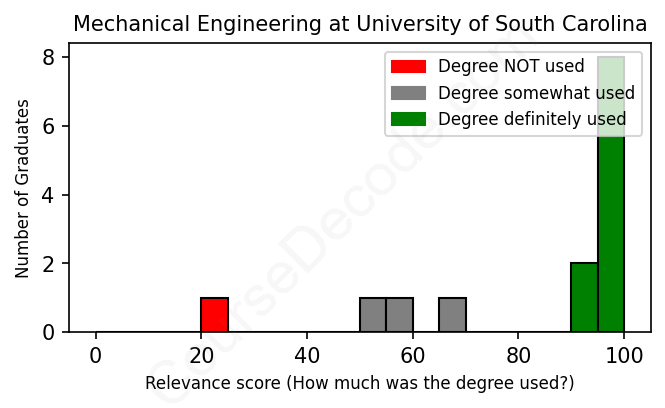
First, some facts. Of the Mechanical Engineering graduates from University of South Carolina we've analyzed , here's how many have used (or NOT used) their degree in their career:

These are estimates based on AI analysis of 14 LinkedIn profiles (see below).
The verdict? Significantly above average. Overall, with an average relevance score of 84%, Mechanical Engineering graduates from University of South Carolina have a much higher likelihood (+17%) of finding work in this field compared to the average graduate across all fields:
And for comparison, here's the chart for all profiles we've looked at across all degrees.
Also, after graduating, only 14% of these graduates have pursued further education other than another Bachelor's degree (such as a Masters degree or other), compared to the average across all profiles of 35%. This suggests a Bachelors degree is enough for most Mechanical Engineering graduates, and it's normal to look for work straight after graduation.
See the details:
|
Relevance score: 93% We think this person has gone into a career highly relevant to their degree. We think this person has gone into a career highly relevant to their degree.
DEGREE INFOGraduated in 2018 from University of South Carolina with a Bachelor's degree in Mechanical Engineering. No other secondary education since. JOB HISTORY SINCE GRADUATIONField Engineer TRC Solutions Aug 2018 - May 2019 Technical Support Engineer  United Mechanical Corporation Jun 2019 - Jan 2020 Mechanical Engineer  US Army Corps of Engineers Jan 2020 - Present ABOUTI graduated from the University of South Carolina with a Bachelor's degree in Mechanical Engineering in May of 2018. I have taken and passed the FE exam in April of 2018. |
The top 10 most common jobs done by the graduates we've analyzed (ranked most common to least) are:
Here is a visual representation of the most common words in job titles for Mechanical Engineering graduates (this is across all Mechanical Engineering graduates we've analyzed, not just those who went to University of South Carolina):

Looking at the career trajectories of graduates from the University of South Carolina's Mechanical Engineering program, it becomes clear that many of them have found solid footing in relevant engineering roles right after graduation. Typically, their first jobs seem to fall within the realm of engineering projects, support, or research positions. For instance, several graduates started off as project engineers, mechanical engineers, or in technical roles that allowed them to leverage their educational background effectively. This initial jump into engineering doesn't appear to be a fluke, as many stick around in the field and gradually move into supervisory, managerial, or specialized positions within a few years.
Fast forward 5 to 10 years post-graduation, and you'll see a significant portion of these graduates moving up the ranks within their organizations or transitioning into roles with more responsibility and leadership. Many have made their way into managerial positions, such as Quality Managers or Senior Engineers, while others have ventured into project management or specialized roles within key industries like defense, automotive, or technology. Overall, it looks like most of them are on a promising track, leveraging their mechanical engineering backgrounds to carve out successful careers—definitely a good sign for anyone considering this degree!
Getting a Bachelor’s degree in Mechanical Engineering can definitely be challenging, and the program at the University of South Carolina is no exception. You’ll dive into a ton of tough subjects like physics, calculus, and thermodynamics, which can sometimes feel overwhelming, especially if math isn’t your strong suit. It's not just about hitting the books; you’ll also have hands-on projects and labs that demand creativity and critical thinking. While some students find it manageable, others might struggle since the coursework is pretty rigorous compared to other majors. Overall, it's a solid program that requires dedication, but if you're passionate about engineering, it's totally worth the effort!
Most commonly, in the LinkedIn profiles we've looked at, it takes people 5 years to finish a Bachelor degree in Mechanical Engineering.
So, when you look at these Mechanical Engineering graduates from the University of South Carolina, it seems like they’re generally doing pretty well in terms of making decent money. Most of the people on this list have either climbed the career ladder quickly or landed solid engineering roles right out of college—like those working at big companies such as the US Navy, Harsco Rail, and BMW. Even the newer grads are starting off in positions that have good growth potential. While exact salaries can vary a lot depending on location and specific roles, the trajectory they seem to be on suggests they're likely earning a comfortable income—and they’ve got a solid foundation for even bigger paychecks down the line!
Here is a visual representation of the most common words seen in the "about" section of LinkedIn profiles who have a Bachelor degree in Mechanical Engineering (this is across all Mechanical Engineering graduates we've analyzed, not just those who went to University of South Carolina). This may or may not be useful:

Here are all colleges offering a Bachelor degree in Mechanical Engineering (ordered by the average relevance score of their Mechanical Engineering graduates, best to worst) where we have analyzed at least 10 of their graduates: